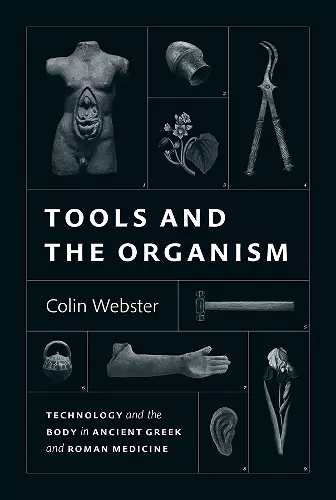Tools and the Organism
Technology and the Body in Ancient Greek and Roman Medicine
Format:Hardback
Publisher:The University of Chicago Press
Published:9th Jan '24
Should be back in stock very soon

This book delves into how ancient tools influenced the understanding of human anatomy, highlighting the interplay between technology and medical theories in antiquity.
In Tools and the Organism, Colin Webster explores the historical emergence of bodily organ concepts and how ancient tools shaped our understanding of human anatomy. The book presents a compelling argument that medicine, as a form of technology, has evolved through the application of various tools and substances to the human body. Webster emphasizes that these therapeutic instruments were instrumental in shifting theoretical perspectives throughout antiquity, altering our perceptions of the body's nature and function.
By examining the evolution of medical tools, Tools and the Organism reveals how the body was conceptualized as an 'organism'—a complex system where each part serves a specific function. Webster's analysis highlights the interplay between technology and medical theory, demonstrating that the development of specific tools led to new understandings of how bodily systems operate. For instance, advancements in water-delivery technologies and pneumatic tools significantly influenced ancient theories of the vascular system and respiration.
Webster provides a comprehensive overview of how technologies have impacted notions of corporeality while also focusing on the material aspects of ancient tools. This dual approach allows readers to appreciate the intricate relationship between technology and medical thought in Greco-Roman times. Ultimately, Tools and the Organism makes a strong case for the necessity of considering technological advancements when studying the history of ancient medical theories from the Hippocratics to Galen.
“Webster has written a fascinating and challenging book . . . there are provocative insights on almost every page. Above all, it enlarges our understanding of the development of Greek medical ideas by providing a bridge between medical and non-medical ideas of the human organism and between the words of philosophers and physicians and the unheard world of the artisan craftsman.” * British Journal for the History of Science *
“Webster’s book delivers a rich, multilayered exploration of how ancient thinkers used tools—both literal and metaphorical—as a lens to understand the human body. His work not only deepens our comprehension of ancient medicine but also skillfully bridges classical and contemporary perspectives on the body as a sophisticated system of organa.” * Technology and Culture *
“Taken as a whole . . . this is an original, engaging and thought-provoking monograph. Webster raises many questions, both about his specific topic and more basic epistemological questions about how knowledge was constructed in the past—and indeed how we do so today.” * Journal of the History of Biology *
“Webster offers a novel and sophisticated analysis of the debates found in ancient medical writers' works, with an argument grounded in the societies that produced the texts.” * Choice *
“[Webster] ends by pointing out how successful the analogy with tools and mechanisms has been both in advancing understanding of how the body functions, and as a spur to inventing machines that would do the work of the body e.g. iron lungs. This book will appeal to the classicist interested in original sources and interpretation of the Greek, to the medical historian, and any doctor with an interest in medical history.” * Classics for All *
“Tools and the Organism makes the novel and convincing argument that ancient Greek medical and philosophical conceptions of the body were influenced at a fundamental level by contemporary technologies. Webster’s observations are fresh, creative, and insightful.” -- Claire Bubb, New York University
“A compelling, enriching, and original book. Webster transforms our understanding of the relationship between technology and corporeality in the ancient world and beyond.” -- Rebecca Flemming, University of Exeter
“Tools and the Organism offers a fascinating, original, and persuasive account of how the concept of the organic body developed in feedback loops with the use of technology. Webster’s analysis is admirably nuanced in its reading of ancient Greek medical and philosophical texts in their material environment. He also shows the significance of this early history to contemporary thinking about the organism.” -- Brooke Holmes, Princeton University
ISBN: 9780226828770
Dimensions: 229mm x 152mm x 28mm
Weight: 567g
320 pages